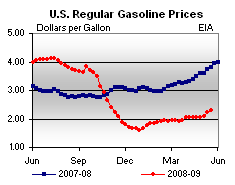
President Barack Obama sent a letter of support this week to the Governor’s Biofuels Coalition endorsing corn-based ethanol.
“My administration is committed to moving as quickly as possible to commercialize an array of emerging cellulosic technologies so that tomorrow’s biofuels will be produced from sustainable biomass feedstocks and waste materials rather than corn,” Obama wrote in his letter to the coalition of governors.
“But this transition will be successful only if the first-generation biofuels industry remains viable in the near term.”
As we've been reporting here all along, supporters of oil have mounted their all-out attack against corn ethanol to shut down the alternative fuels industry. As goes corn ethanol, so goes the whole biofuels effort.
Forrtunately, a wide range of supporters, across the political aisle and across the country remain committed to a vibrant biofuels future. And that means moving forward with the technology and infrastructure that is available now.
Thank you President Obama for your strong support shown this week for biofuels, especially corn ethanol.
Source: Governors Biofuels Coalition
- Find Alternative Fuel Locations
- America's Energy Source Choice: Midwest or Middle East?
- Biofuel Myths vs Facts
Follow Us --> Food and Fuel America on Twitter
Never Miss a New Article--> Subscribe to updates by EmailFind What You Seek --> Search FoodandFuelAmerica.com
Food and Fuel America.com
http://www.foodandfuelamerica.com
Good and Balanced Food and Fuel News!











